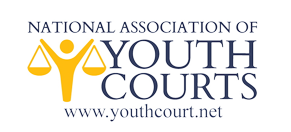TOP TEN REASONS FOR CREATING A YOUTH COURT PROGRAM IN YOUR COMMUNITY
1. Youth courts reduce the chances of a repeat offense by teaching students the legal consequences of their actions.
Youth courts are restorative justice programs that reduce juvenile crime through education and accountability; youth courts offer students an opportunity to learn about the adult and juvenile criminal justice systems.
2. Youth courts provide students who accept responsibility for their actions with a second chance before going to juvenile court.
Youth courts are an alternative for teens who might otherwise end up with a formal record in the juvenile justice system.
3. Youth courts seek to integrate – not segregate – youthful offenders from the community by requiring their active involvement in the resolution of cases involving other students.
Through jury service in other cases, students learn the appropriate use of positive peer pressure to assist other students who made a poor decision.
4. Youth courts encourage the active participation of parents and guardians in the restorative process.
Youth courts assist the adults in a child’s life to support the student in the completion of the program.
5. Youth courts give each student individualized attention.
The youth court disposition is designed to meet the particular needs of each student and their family.
6. Youth courts provide an opportunity to become involved in community volunteer work.
Many youth courts require the student to engage in a certain number of community service hours as a measure of accountability, as a way of demonstrating the value of meeting community needs, and as part of the restorative process.
7. Youth courts foster improved relationships with adults in positions of authority.
Participation in youth court activities encourages positive interaction between students, law enforcement, attorneys, and other persons in the juvenile justice system.
8. Youth court dispositions carry a high level of credibility because they are developed by a student’s peers, not imposed by an adult.
Kids speaking to kids greatly facilitates the restorative process because of a greater willingness of the student to accept the decision of other students.
9. Youth courts hold students directly accountable for their actions.
Youth courts are founded on the principal that there is no such thing as a “victimless crime” – at the very least the sanctity of the community has been harmed – the court process permits the restoration of the student and the community.
10. Youth courts are a cost-effective way for a community to address juvenile delinquency.
Because youth courts address offenses before students become entrenched in criminal activity and because they are largely run by volunteers, youth courts have been shown to be a low cost, but effective program for reducing repeat offenses by our youth.

